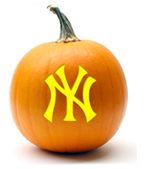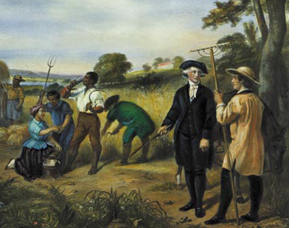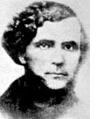BLOG, or DIE. Author Bio
Monday, 26 October 2009
Christmas in October
 I’ve waited to post anything on the ALCS in fear of jinxing the outcome, but as I sit here watching Mariano Rivera close out Game 6 with a score of NYY 5 - LAA 2, I can safely acknowledge that the 2009 Bronx Bombers have secured the victory and a ticket to the Fall Classic. Well done gentlemen. Well done!
I’ve waited to post anything on the ALCS in fear of jinxing the outcome, but as I sit here watching Mariano Rivera close out Game 6 with a score of NYY 5 - LAA 2, I can safely acknowledge that the 2009 Bronx Bombers have secured the victory and a ticket to the Fall Classic. Well done gentlemen. Well done!
What makes this particular AL Pennant even sweeter is the fact that the New York Yankees will be moving on to meet the NL’s defending World Champion Philadelphia Phillies. The “Phils” of course are the beloved team of my friend and co-author Eric Wittenberg, as well as Dave Raymond, the original “Phillie Phanatic” and Foreword contributor to our upcoming book You Stink! Major League Baseball’s Terrible Teams and Pathetic Players. (How ironic that in the very season we completed our manuscript, both of our teams are meeting in the grand finale.)
To me, there is nothing better than the World Series and this year’s promises to be a great one. Both teams are excellent on both sides of the plate and I can easily see this ending in an epic Game 7. Of course Eric and I have pledged to root against one another with a renewed vigor, and then translate that experience into a new addition to our book’s Introduction.
I may not know a lot about a lot of things, but I do know a little about baseball. As a freelance writer, I started out as a contributor for Baseball-Almanac where I researched and authored their entire historical section including the World Series, All-Star Game, Year in Review and Post-Season recaps. This was in addition to writing bios, essays and editorial pieces. From 2000-2006, I penned over 375 pieces for BA and I loved every minute of it. Nowadays, I watch more Yankees games than any other sporting event and I can’t wait to participate in the MLB Fantasy League at my new job. (I heard a rumor that the U.S. Marshals have a killer rotisserie league.)
People are already emailing me for my predictions and all I will say is that the Yankees must get consistency out of their bullpen, specifically from their middle relievers, and the swingers must stop leaving so many runners stranded on base. Philadelphia is a strong contender and I feel this series will come down to the starters. Whoever has the stronger rotation wins. Hitters won’t be a defining factor - whiffers will. Although both ballparks favor the bat, defense will be the key. This postseason has already given us a fielding highlight reel. Look for low-scoring games and lots of ‘K’s. NY wins in 6 games.
Related links:
Luckiest Fans on the Face of this Earth (eBook)
Articles on MLB history for Baseball-Almanac

Wednesday, 21 October 2009
No wonder they fought for it.
 Earlier this month, I posted that I was reading Gary Wills’ book “Negro President” Jefferson and the Slave Power. I am enjoying it to say the least, and I can’t wait to finish so I can start The Hemingses of Monticello: An American Family by Annette Gordon-Reed. The latter was a bon voyage gift from a good friend and member of The Jefferson Project. Thank you Liane. As a result, I have pledged to read nothing but Jefferson books for the remainder of the year. That said, the Wills book has really opened my eyes to a whole new perspective of America’s Founding Fathers and the nation’s practice of slavery. I had absolutely no idea how influential (even crucial) the institution was to the establishment and operation of the federal government. Slavery yielded a political power that affected all branches at every level.
Earlier this month, I posted that I was reading Gary Wills’ book “Negro President” Jefferson and the Slave Power. I am enjoying it to say the least, and I can’t wait to finish so I can start The Hemingses of Monticello: An American Family by Annette Gordon-Reed. The latter was a bon voyage gift from a good friend and member of The Jefferson Project. Thank you Liane. As a result, I have pledged to read nothing but Jefferson books for the remainder of the year. That said, the Wills book has really opened my eyes to a whole new perspective of America’s Founding Fathers and the nation’s practice of slavery. I had absolutely no idea how influential (even crucial) the institution was to the establishment and operation of the federal government. Slavery yielded a political power that affected all branches at every level.
To quote a review: The book focuses on the influence of slaveholding in United States politics from the post-revolutionary period through the 1840’s, especially 1800 through 1808. It provides a vivid portrait of unsavory and generally ignored aspects of the political career of Thomas Jefferson, the “Negro President” of the title. His opponents styled him thus after the presidential election of 1800, because he would have lost it had not the South’s representation in Congress and the Electoral College been augmented by 60 percent of the census of slaves. This was the “three-fifths clause” of the Constitution at work.
That’s the basic premise for the book and Wills does as extraordinary job of outlining the three-fifths affect and how much power the South maintained as a result. This passage from Chapter 1 in particular, really caught my attention:
In the sixty-two years between Washington’s election and the Compromise of 1850, for example, slaveholders controlled the presidency for fifty-years, the Speaker’s chair for forty-one years, and the chairmanship of House Ways and Means [the most important committee] for forty-two years. The only men to be re-elected president – Washington, Jefferson, Madison, Monroe, and Jackson – were all slaveholders. The men who sat in the Speaker’s chair the longest – Henry Clay, Andrew Stevenson, and Nathaniel Macon – were slaveholders. Eighteen out of thirty-one Supreme Court justices were slaveholders.
Wills continues to outline additional high-level political positions held by slaveholders (or descendents of slaveholders) all the way up to the turn of the century. To be honest, I never realized how much the federal government was influenced, even controlled somewhat by the institution of bondage. My conclusion: slavery equaled political power, thus political power required slavery. I find that disturbing.
More thoughts to come as I continue to read this fascinating study…

Monday, 19 October 2009
Press Release
Here is a PDF of the official announcement from The History Press for my fifth and newest book, The Civil War in Spotsylvania: Confederate Campfires at the Crossroads.

Lawman's legacy
 This will be the third, and perhaps last post before I start my new Technical Writer position with the U.S. Marshals. As I adjust to my commute, I hope to blog from the train via my Blackberry, but we’ll see how that goes. One of the many things that immediately impressed me about this outfit was their obvious dedication to preserving their own legacy. History really matters to the U.S. Marshals and the moment you enter their headquarters, you are greeted by a large statue of Wyatt Earp. At my panel interview, I was tested on my knowledge of the organization. Fortunately, I had prepped myself by spending some time on their website. Who knows? Maybe someday I'll write a book on the subject.
This will be the third, and perhaps last post before I start my new Technical Writer position with the U.S. Marshals. As I adjust to my commute, I hope to blog from the train via my Blackberry, but we’ll see how that goes. One of the many things that immediately impressed me about this outfit was their obvious dedication to preserving their own legacy. History really matters to the U.S. Marshals and the moment you enter their headquarters, you are greeted by a large statue of Wyatt Earp. At my panel interview, I was tested on my knowledge of the organization. Fortunately, I had prepped myself by spending some time on their website. Who knows? Maybe someday I'll write a book on the subject.
Much like the U.S. Marine Corps, the U.S. Marshals Service wants their people at every level to fully appreciate the history of those who came before them. As the oldest federal law enforcement agency in the United States, they have apprehended more fugitives than all other law-enforcement agencies combined. As a historian, I love the fact that this group embraces their heritage and goes to great lengths to instill the same values of those who came before them. The list of noteworthy U.S. Marshals is a long one and includes familiar names such as Wyatt Earp, Wild Bill Hickok, and even Frederick Douglass (I never knew that.) Two Confederate Generals also wore the silver-star, Benjamin McCulloch, U.S. Marshal for Eastern District of Texas; who became a brigadier general, and Richard Griffith, who was mortally wounded at the Battle of Savage's Station during the 1862 Peninsula Campaign.
Griffith is a particularly interesting character in southern Civil War history as he was originally from Pennsylvania. He was born in Philadelphia and graduated from Ohio University before moving to Vicksburg, Mississippi. During the Mexican War, Griffith served as an infantryman with the 1st Mississippi Rifles. It was there where he met and became close friends with an up-and-coming colonel named Jefferson Davis. After the war Griffith left the army for civilian life and worked as both a banker and a U.S. Marshal. He also held the rank of brigadier general in the Mississippi State Militia.
At the outbreak of the War Between the States, Griffith sided with the Confederacy and was immediately appointed as a colonel in the 12th Mississippi Infantry. One year later he was promoted to brigadier general and put in command of four Mississippi regiments that became part of Maj. Gen. John B. Magruder’s division. Griffith saw action at the Seven Days Battles near the Confederate capital of Richmond. During that engagement he was mortally wounded in his thigh by a shell fragment. As he died he was recorded to have said, “If only I could have led my brigade through this battle, I would have died satisfied.”
According to his bio: The loss of General Griffith was much lamented by many, including his long-time friend Jefferson Davis. Of the fighting at Savage Station he wrote, “Our loss was small in numbers, but great in value. Among others who could ill be spared, here fell the gallant soldier, the useful citizen, the true friend and Christian gentleman, Brigadier General Richard Griffith. He had served with distinction in foreign war, and, when the South was invaded, was among the first to take up arms in defense of our rights.” Later in the war, a group of soldier-musicians called “The McLaws Minstrels,” serving under Lafayette McLaws and formerly under General Griffith, would play at a theater in Fredericksburg. They charged a modest admission fee, the proceeds from which were used to erect a monument in the Mississippi State Capitol in honor of their fallen commander.
Today, Brig. Gen. Richard Griffith is buried in Greenwood Cemetery in Jackson, MS.

Friday, 16 October 2009
Taking requests
 As the start date for my new job with the U.S. Marshals approaches, I have found myself eagerly anticipating the many changes that will now affect my work day. Perhaps the biggest adjustment will come in the form of the commute. Not one to sit still much, I have been looking at constructive ways to pass the time on the train. In addition to reading, music has always been a great traveling companion of mine. Recently I re-discovered Classical music. While in school, I developed a serious liking to instrumental film soundtracks that led to my appreciation of the master composers. Over the years, I moved away from the genre, but after coming back, I feel a renewed vigor and appreciation for it. Perhaps I'm finally cool with being un-cool. (Apparently this is nothing new, as my kids have known I'm a geek for years.)
As the start date for my new job with the U.S. Marshals approaches, I have found myself eagerly anticipating the many changes that will now affect my work day. Perhaps the biggest adjustment will come in the form of the commute. Not one to sit still much, I have been looking at constructive ways to pass the time on the train. In addition to reading, music has always been a great traveling companion of mine. Recently I re-discovered Classical music. While in school, I developed a serious liking to instrumental film soundtracks that led to my appreciation of the master composers. Over the years, I moved away from the genre, but after coming back, I feel a renewed vigor and appreciation for it. Perhaps I'm finally cool with being un-cool. (Apparently this is nothing new, as my kids have known I'm a geek for years.)
Until recently, I always listened to Talk Radio, but that forum had become so politically charged and divisive, I could hardly stand a minute of it. Frankly, it made me angry, so one day I tuned into a local Classical station as I traveled to and from work. Amazingly, the music had a tremendous calming affect on me and I began to feel incredibly relaxed and replenished. When I got home, I loaded my entire iPod with my Classical CD collection including symphonies from Mozart, Tchaikovsky, and Handel. It was as if I was reacquainting myself with an old friend. I am fortunate that Virginia gets one of the top Classical public radio stations in the country WETA 90.9 FM. Now I find myself listening to Classical as I write and I think my output is improving.
I hope that my musical knowledge and tastes will continue to evolve as I spend more time listening to this style. I know I have plenty of "high-brow" readers out there, so please feel free to recommend any concertos, sonatas or symphonies that you think I may enjoy. The historian in me is especially interested in compiling the kinds of tunes that our Founding Fathers enjoyed. I wonder what was on Jefferson's iPod?

Newer | Latest | Older
 I’ve waited to post anything on the ALCS in fear of jinxing the outcome, but as I sit here watching Mariano Rivera close out Game 6 with a score of NYY 5 - LAA 2, I can safely acknowledge that the 2009 Bronx Bombers have secured the victory and a ticket to the Fall Classic. Well done gentlemen. Well done!
I’ve waited to post anything on the ALCS in fear of jinxing the outcome, but as I sit here watching Mariano Rivera close out Game 6 with a score of NYY 5 - LAA 2, I can safely acknowledge that the 2009 Bronx Bombers have secured the victory and a ticket to the Fall Classic. Well done gentlemen. Well done! 





 Earlier this month, I
Earlier this month, I  This will be the third, and perhaps last post before I start my new Technical Writer position with the U.S. Marshals. As I adjust to my commute, I hope to blog from the train via my Blackberry, but we’ll see how that goes. One of the many things that immediately impressed me about this outfit was their obvious dedication to preserving their own legacy. History really matters to the U.S. Marshals and the moment you enter their headquarters, you are greeted by a large statue of Wyatt Earp. At my panel interview, I was tested on my knowledge of the organization. Fortunately, I had prepped myself by spending some time on their website. Who knows? Maybe someday I'll write a book on the subject.
This will be the third, and perhaps last post before I start my new Technical Writer position with the U.S. Marshals. As I adjust to my commute, I hope to blog from the train via my Blackberry, but we’ll see how that goes. One of the many things that immediately impressed me about this outfit was their obvious dedication to preserving their own legacy. History really matters to the U.S. Marshals and the moment you enter their headquarters, you are greeted by a large statue of Wyatt Earp. At my panel interview, I was tested on my knowledge of the organization. Fortunately, I had prepped myself by spending some time on their website. Who knows? Maybe someday I'll write a book on the subject.  As the start date for my new job with the U.S. Marshals approaches, I have found myself eagerly anticipating the many changes that will now affect my work day. Perhaps the biggest adjustment will come in the form of the commute. Not one to sit still much, I have been looking at constructive ways to pass the time on the train. In addition to reading, music has always been a great traveling companion of mine. Recently I re-discovered Classical music. While in school, I developed a serious liking to instrumental film soundtracks that led to my appreciation of the master composers. Over the years, I moved away from the genre, but after coming back, I feel a renewed vigor and appreciation for it. Perhaps I'm finally cool with being un-cool. (Apparently this is nothing new, as my kids have known I'm a geek for years.)
As the start date for my new job with the U.S. Marshals approaches, I have found myself eagerly anticipating the many changes that will now affect my work day. Perhaps the biggest adjustment will come in the form of the commute. Not one to sit still much, I have been looking at constructive ways to pass the time on the train. In addition to reading, music has always been a great traveling companion of mine. Recently I re-discovered Classical music. While in school, I developed a serious liking to instrumental film soundtracks that led to my appreciation of the master composers. Over the years, I moved away from the genre, but after coming back, I feel a renewed vigor and appreciation for it. Perhaps I'm finally cool with being un-cool. (Apparently this is nothing new, as my kids have known I'm a geek for years.)